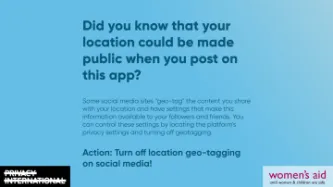Search
Content type: Explainer
In a scramble to track, and thereby stem the flow of, new cases of Covid-19, Governments around the world are rushing to track the locations of their populace. One way to do this is to write a smartphone app which uses Bluetooth technology, and encourage (or mandate) that individuals download and use the app. We have seen such examples in Singapore and emerging plans in the UK.
Apps that use Bluetooth are just one way to track location. There are several different technologies in a smartphone…
Content type: Examples
The Romanian government has formally notified the Council of Europe under Article 15, paragraph 3 of the ECHR of the country's state of emergency decree, noting that some of the measures being taken involve derogations from the obligations under the Convention.
Source: https://rm.coe.int/09000016809cee30
Writer: Permanent Representation of Romania
Publication: Official letter
Content type: Examples
On March 14, Romanian president Klaus Iohannis announced a state of emergency to make it possible to allocate new resources for crisis management, and urged the public to follow isolation guidelines and hygiene rules. The Parliament must approve within five days, and the state of emergency lasts 30 days. The decree allows the government to carry out checks on persons and places, order temporary closures of shops and other public places, halt the distribution of publications or broadcasts, and…
Content type: Examples
On March 14, the Peruvian government set up a website for individuals to check their symptoms so they can be directed towards sources of help. The web form asks for ID number, phone, email and home address.
Source: https://www.gob.pe/coronavirus
Writer: Peruvian government
Publication: Peruvian government
Content type: Examples
Under a new protocol, international passengers arriving at Lime's Jorge Chavez International Airport or by ship at Callao Port, is referred to medical staff if they are arriving from places with confirmed cases, even if they are asymptomatic. Passengers who show symptoms in transit are transferred to isolation areas, where they receive care. The passengers are also required to supply personal information so they can be surveilled over the following days.
Source: https://andina.pe/ingles/…
Content type: Examples
The Indonesian Doctors Association has asked the government to open up the identity of patients who have tested positive for the novel coronavirus in order to facilitate contact tracing and improve the efficiency of efforts to prevent further spread, arguing that in an emergency like this the public will support the disclosure in the interests of safety.
Source: https://mediaindonesia.com/read/detail/296992-permudah-kontak-tracing-idi-dorong-pemerintah-buka-data-pasien
Writer: Atalya…
Content type: Examples
The first two confirmed cases of COVID-19 in Indonesia and their neighbours became the targets of media coverage and social media abuse after their personal details were spread via WhatsApp and other social media soon after the President announced the positive tests results - before anyone told the patients themselves. The Health Ministry denied responsibility for the data breach.
Sources:
https://www.thejakartapost.com/news/2020/03/04/covid-19-patients-become-victims-of-indonesias-lack-of-…
Content type: Examples
India has begun stamping the hands of people arriving at airports in the states of Maharashtra and Karnataka to specify the date until which they must remain in quarantine. The government is also using airline and railway reservation data to track suspected infections and find hand-stamped people who had promised not to travel. Kerala authorities have used telephone call records, CCTV footage, and mobile phone GPS systems to trace contracts of COVID-19 patients, and published detailed time and…
Content type: Examples
UK: O2 shares aggregated location data with government to test compliance with distancing guidelines
Mobile network operator O2 is providing aggregated data to the UK government to analyse anonymous smartphone location data in order to show people are following the country's social distancing guidelines, particularly in London, which to date accounts for about 40% of the UK's confirmed cases and 30% of deaths. The project is not designed to monitor individuals. Lessons from the impact on London of travel restrictions could then be applied in the rest of the country. The government says it has…
Content type: Examples
BT, owner of UK mobile operator EE, is in talks with the government about using its phone location and usage data to monitor whether coronavirus limitation measures such as asking the public to stay at home are working. The information EE supplies would be delayed by 12 to 24 hours, and would provide the ability to create movement maps that show patterns. The data could also feed into health services' decisions, and make it possible to send health alerts to the public in specific locations.…
Content type: Examples
The coronavirus action plan announced on March 3, alongside many measures for managing the NHS in the crisis, will also allow the Investigatory Powers Commissioner to appoint judicial commissioners (JCs) on a temporary basis in the event that there are insufficient JCs available to operate the system under the Investigatory Powers Act 2016. The Home Secretary, at the request of the Investigatory Powers Commissioner, will also be allowed to vary the time allowed for urgent warrants to be…
Content type: Long Read
Commercial interests seem to often overshadow the EU’s stance as a global privacy leader. After looking at Europes's shady funds to border forces in the Sahel area, Niger's new biometric voting system, and attempts to dismantle smugglers networks powered by Europe's gifts of surveillance, freelance journalist Giacomo Zandonini looks at the battle for data protection and digital rights in the continent.
What do a teenage labourer on a marijuana farm in Lesotho, a…
Content type: Long Read
Valentine’s Day is traditionally a day to celebrate relationships, but many relationships that begin romantically can quickly become controlling, with partners reading emails, checking texts and locations of social media posts. This can be just the beginning.
Today, Friday 14th February, Privacy International and Women’s Aid are launching a series of digital social media cards giving women practical information on how to help stay safe digitally from control and abuse.
Did you know…
Content type: News & Analysis
In mid-2019, MI5 admitted, during a case brought by Liberty, that personal data was being held in “ungoverned spaces”. Much about these ‘ungoverned spaces’, and how they would effectively be “governed” in the future, remained unclear. At the moment, they are understood to be a ‘technical environment’ where personal data of unknown numbers of individuals was being ‘handled’. The use of ‘technical environment’ suggests something more than simply a compilation of a few datasets or databases.
The…
Content type: News & Analysis
Today Advocate General (AG) Campos Sánchez-Bordona of the Court of Justice of the European Union (CJEU), issued his opinions (C-623/17, C-511/18 and C-512/18 and C-520/18) on how he believes the Court should rule on vital questions relating to the conditions under which security and intelligence agencies in the UK, France and Belgium could have access to communications data retained by telecommunications providers.
The AG addressed two major questions:
(1) When states seek to impose…




